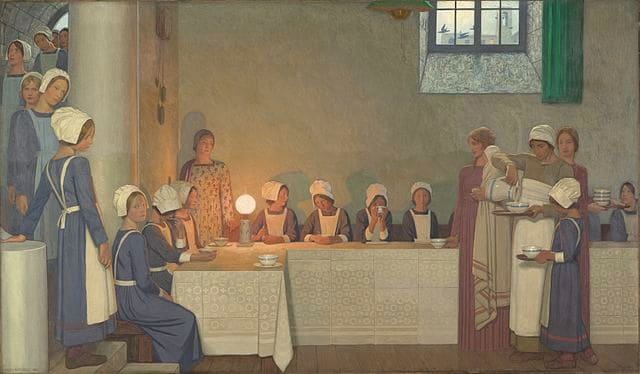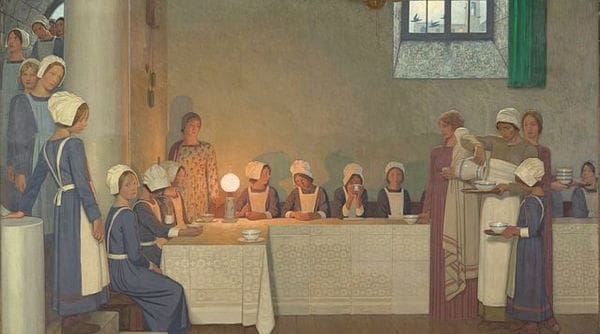The Family as Domestic Church:
How She Hands on the Faith
(Part III of IV)
Editor’s Note: In Part I, we examined how the four marks of the Church apply to the family. Part II considered our baptismal call to being priest, prophet and king by delving into what it means to be priest in the secular world and how parents carry that out within the family. Today, we will look at what it means to be prophet and king.
What it Means to be Priest, Prophet and King in the Secular World (continued)
What it means to be prophet: Being a prophet doesn’t mean predicting what’s going to happen, but instead involves the role of speaking the truth, particularly when it is inconvenient, or when people, especially those with the power to make life miserable for someone, would rather not hear it. As Christ preached and prophesized the kingdom of God through his words and actions, families members also, through their baptisms, have the “ability and responsibility to accept the Gospel in faith and proclaim it in word and deed, without hesitation [in order] to courageously identify and denounce evil.”[35] They act as “a sign of Christ’s love and faithfulness to a world that is enmeshed in the culture of death.”[36] They must have the willingness “to let the Gospel shine out everyday in their family and social life”[37] no matter what the cost. This can be very difficult for, “Prophets are not without honor, except in their hometown, and among their own kin, and in their own house.”[38] When a child learns that the unborn, the ill and disabled, the arrogant and obnoxious, the emotionally needy, the mean-spirited and the self-involved, the aging and the dying, those who have hurt us and those we disagree with, have dignity and value because they are made in the image of God, they learn to see and love others the way God sees and loves us. This can be a particularly poignant lesson when the person with what the world considers “challenges” is a close family member or friend.

Parents also teach their children how to proclaim the Gospel by their speech and actions in their dealings with those outside the family. In this way, the family acts as leaven for the world through words and example of virtuous lives lived according to the Gospel. The family later also serves as leaven when the children are sent out into the world and take the Gospel with them to the respective vocations and states of life God calls them, whether lay, religious or ordained. Thus, “the family is placed at the service of the building up of the Kingdom of God in history by participating in the life and mission of the Church.”[39]
What it means to be king: Families share in the kingly mission of Christ by working to overcome the kingdom of sin in themselves. Then, unlike worldly kings and leaders who sometimes lord it over others, families can be “good kings” by serving and sacrificing for the needs of their members, and those outside the family, in justice and charity. Called by Christ to make him known in the secular world, they help spread his Kingdom in history.[40] That means serving Christ in all his disguises, especially among the poor, the hungry, the infirm and the aged, and all those society considers lacking in dignity. “The Christian family…is called to exercise its ‘service’ of love towards God and towards its fellow human beings…[and] finds the authentic meaning of…participation in the kingship of [the] Lord in sharing His spirit and practice of service to man.”[41] Parents, particularly, set the example by helping the neighbor next door, the neighbor in another part of town and the neighbor in another part of the world. The holy lessons learned in the domestic Church about giving without counting the cost are seeds planted in fertile ground that grow up to yield abundant harvests of holiness.
Editor’s Note: In Part IV, we will look briefly at the universal call to holiness, and conclude the series.
[35] John Paul II, Post-Synodal Apostolic Exhortation, Christifideles Laici: “The Lay Members of Christ’s Faithful People,” (Boston: Pauline Books & Media, 1988), 14§6.
[36] Joseph C. Atkinson, John Paul II Institute, 6 Dec. 2009 <http://thedomesticchurch.com/> 8.
[37] Christifideles Laici 14§6.
[38] Mark 6:4.
[39] John Paul II, Apostolic Exhortation, Familiaris Consortio, “The Role of the Christian Family in the Modern World (Boston: Pauline Books & Media, 1981), 49§1.
[40] Cf Christifideles Laici 14§7.
[41] Familiaris Consortio 63§4.
Art: Orphan girls entering the refectory of a hospital, Cayley Robinson, 1915, CCA-International, Wikimedia Commons.




